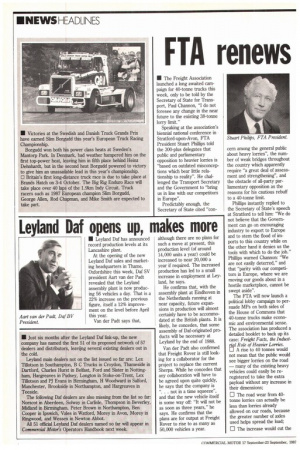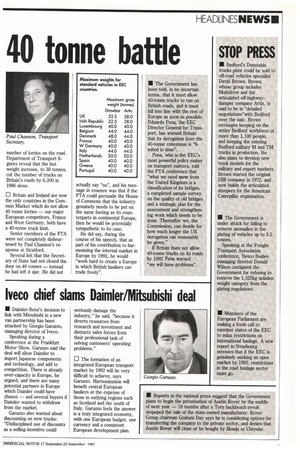FTA renews 40 tonne bathe
Page 6

Page 7

If you've noticed an error in this article please click here to report it so we can fix it.
• The Freight Association launched a long awaited campaign for 40-tonne trucks this week, only to be told by the Secretary of State for Transport, Paul Channon, "I do not foresee any change in the near future to the existing 38-tonne lorry limit."
Speaking at the association's biennial national conference in Stratford-upon-Avon, FTA President Stuart Phillips told the 300-plus delegates that public and parliamentary opposition to heavier lorries is "based on outdated misconceptions which bear little relationship to reality". He challenged the Transport Secretary and the Government to "bring us in line with our competitors in Europe".
Predictably enough, the Secretary of State cited "con cern among the general public about heavy lorries", the number of weak bridges throughout the country which apparently require "a great deal of assessment and strengthening", and the obstacle of all-party parliamentary opposition as the reasons for his cautious rebuff to a 40-tonne limit.
Phillips instantly replied to the Secretary of State's speech at Stratford to tell him: "We do not believe that the Government can go on encouraging industry to export to Europe and to stem the flood of imports to this country while on the other hand it denies us the tools with which to do the job." Phillips warned Channon: "We are not easily deterred," and that "parity with our competitors in Europe, where we are moving our goods about in a hostile marketplace, cannot be swept aside".
The FTA will now launch a political lobby campaign to persuade MPs on both sides of the House of Commons that 40-tonne trucks make economic and environmental sense. The association has produced a detailed booklet to back up its case: Freight Facts, the Industrial Role of Heavier Lorries.
O A rise to 40 tonnes would not mean that the public would see bigger lorries on the road — many of the existing heavy vehicles could easily be reregistered to take the extra payload without any increase in their dimensions; O The road wear from 40tonne lorries can actually be less than lorries already allowed on our roads, because the greater number of axles used helps spread the load; O The increase would cut the number of lorries on the road. Department of Transport figures reveal that the last weight increase, to 38 tonnes, cut the number of trucks on Britain's roads by 6,200 in 1986 alone.
• Britain and Ireland are now the only countries in the Common Market which do not allow 40 tonne lorries — our major European competitors, France and West Germany, both have a 40-tonne truck limit.
Senior members of the FTA were not completely disheartened by Paul Charmon's response at Stratford.
Several felt that the Secretary of State had not closed the door on 40 tonnes — instead he had left it ajar. He did not
actually say "no", and his message in essence was that if the FTA could persuade the House of Commons that the industry genuinely needs to be put on the same footing as its counterparts in continental Europe, then he would be potentially sympathetic to its case.
He did say, during the course of his speech, that as part of his contribution to harmonising the internal market in Europe by 1992, he would "work hard to create a Europe in which British hauliers can trade freely".




































































































